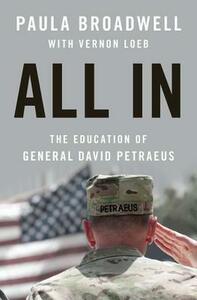Take a photo of a barcode or cover
Narrative is weak,
But a wealth of good detail.
Uncritical eye.
But a wealth of good detail.
Uncritical eye.
While there are "sympathetic" biographies in a good sense, like Robert K. Massie's new bio of Catherine the Great, there are sympathetic bios that aren't so good. And this is one of them.
It's not quite craptacular, but it's nowhere near a "critical" study. Written by a West Point grad, and, as one other reviewer notes, some sort of "authorized" bio, it's got enough of a suck-up attitude that it doesn't question him at all. (The type of people who blurb it on the back, starting with Tom Brokaw, also indicate the quasi suck-up nature.)
For example, did the "surge" in Iraq, combined with the Anbar Awakening, really work, in part, because a fair amount of Sunni ethnic cleansing had already played out, and in part because some awakeners were content to take some cold U.S. cash and bide their time? Author Paula Broadwell never asks these questions, either rhetorically or of her subject.
Nor does she address the questions of whether or not Petraeus is a "political general." (Short answer: Every general is, at least within the Army; career bird colonels are the ones who aren't.)
Also, given the subject matter, it's "interesting" that Broadwell apparently made no attempt to see if anybody would talk off the record about Afghanistan, or Iraq, issues. That goes in hand with a quasi-"approved" bio. Surely a two-star or three-star not in the Petraeus mentorship pipeline would have talked anonymously if Broadwell had wanted to pursue that angle.
Beyond that, it's bland in that we don't learn much new from this book. Pass. Wait 10 years, until he retires (I hope) from the CIA, and see if a real bio is out.
It's not quite craptacular, but it's nowhere near a "critical" study. Written by a West Point grad, and, as one other reviewer notes, some sort of "authorized" bio, it's got enough of a suck-up attitude that it doesn't question him at all. (The type of people who blurb it on the back, starting with Tom Brokaw, also indicate the quasi suck-up nature.)
For example, did the "surge" in Iraq, combined with the Anbar Awakening, really work, in part, because a fair amount of Sunni ethnic cleansing had already played out, and in part because some awakeners were content to take some cold U.S. cash and bide their time? Author Paula Broadwell never asks these questions, either rhetorically or of her subject.
Nor does she address the questions of whether or not Petraeus is a "political general." (Short answer: Every general is, at least within the Army; career bird colonels are the ones who aren't.)
Also, given the subject matter, it's "interesting" that Broadwell apparently made no attempt to see if anybody would talk off the record about Afghanistan, or Iraq, issues. That goes in hand with a quasi-"approved" bio. Surely a two-star or three-star not in the Petraeus mentorship pipeline would have talked anonymously if Broadwell had wanted to pursue that angle.
Beyond that, it's bland in that we don't learn much new from this book. Pass. Wait 10 years, until he retires (I hope) from the CIA, and see if a real bio is out.
Knowing now that this book brought about the end of Petraeus' otherwise unblemished intelligence/military career feels anti-climatic. All it took was one enraged email from Paula to another woman who she felt was muscling in on her man and the man dropped from grace faster than a Hail Mary from the Taliban.
Why did I give this book four stars? Let me explain. After the Paula-Petraeus affair came to light, readers will naturally be left wondering as to how much of Paula's narrative is embellished and how much is real. This will be the onerous task of future historians; how much of Petraeus actually resides within the pages of All In and how much is only Paula projecting her love (for want of a better expression)? With four stars I feel I have left enough room for future maneuver.
On the flip side-and to Paula's credit-she avoids juxtaposing Petraeus against the mighty and the malicious of the War on Terror . And nor is her portrayal of Petraeus (minus the hero worship of which there is aplenty) that of some demi-God soldier-scholar General battling it out with the SOBs on Capitol Hill for Faith and Country. Rather, she renders him in the moment. Petraeus at work; Petraeus in the field and Petraeus in the Senate. Effectively, Petraeus as the archetypal soldier-warrior leader.
Irrespective of her own favouritism, Paula also records the more salient aphorisms and observances of Petraeus. From the onset she makes prescient the undercurrents of tension permeating the fraught relationship between then Vice President (and current President) Joe Biden and Petraeus. Biden, mistakenly, believed that the American strategy in Afghanistan would have been better served with American forces periodically targeting the Islamist leadership. Petraeus differed and reinforced Stanley McChrystal's analysis:
-The Islamist insurgency had to be annihilated at the grassroots with effective and transparent governance in the absence of which it bred itself subtly.
-That ultimately, the Islamic world had to take responsibility for its own political failings in the 21st century.
As we now know, Biden ushered in a repeat of Vietnam.
This book is critical because ultimately it allows us an insight into Petraeus' own self-introspections. Otherwise, take with a pinch of salt. The Petraeus story is not wholly at its end yet. Only after the General expires will we be able to fully assess his impact on history and on the War On Terror .
Why did I give this book four stars? Let me explain. After the Paula-Petraeus affair came to light, readers will naturally be left wondering as to how much of Paula's narrative is embellished and how much is real. This will be the onerous task of future historians; how much of Petraeus actually resides within the pages of All In and how much is only Paula projecting her love (for want of a better expression)? With four stars I feel I have left enough room for future maneuver.
On the flip side-and to Paula's credit-she avoids juxtaposing Petraeus against the mighty and the malicious of the War on Terror . And nor is her portrayal of Petraeus (minus the hero worship of which there is aplenty) that of some demi-God soldier-scholar General battling it out with the SOBs on Capitol Hill for Faith and Country. Rather, she renders him in the moment. Petraeus at work; Petraeus in the field and Petraeus in the Senate. Effectively, Petraeus as the archetypal soldier-warrior leader.
Irrespective of her own favouritism, Paula also records the more salient aphorisms and observances of Petraeus. From the onset she makes prescient the undercurrents of tension permeating the fraught relationship between then Vice President (and current President) Joe Biden and Petraeus. Biden, mistakenly, believed that the American strategy in Afghanistan would have been better served with American forces periodically targeting the Islamist leadership. Petraeus differed and reinforced Stanley McChrystal's analysis:
-The Islamist insurgency had to be annihilated at the grassroots with effective and transparent governance in the absence of which it bred itself subtly.
-That ultimately, the Islamic world had to take responsibility for its own political failings in the 21st century.
As we now know, Biden ushered in a repeat of Vietnam.
This book is critical because ultimately it allows us an insight into Petraeus' own self-introspections. Otherwise, take with a pinch of salt. The Petraeus story is not wholly at its end yet. Only after the General expires will we be able to fully assess his impact on history and on the War On Terror .



